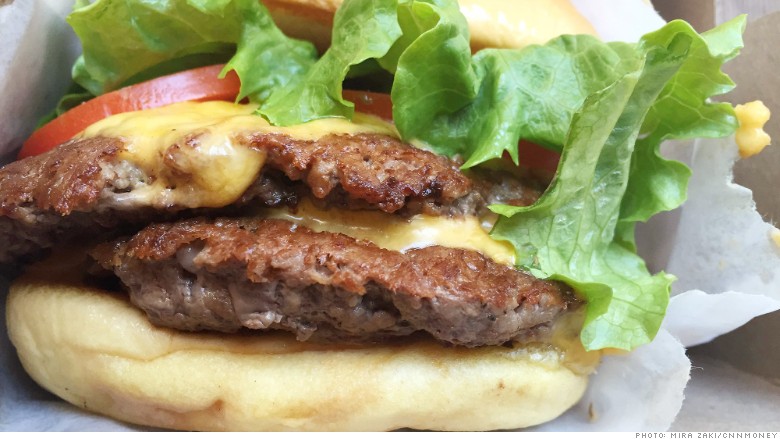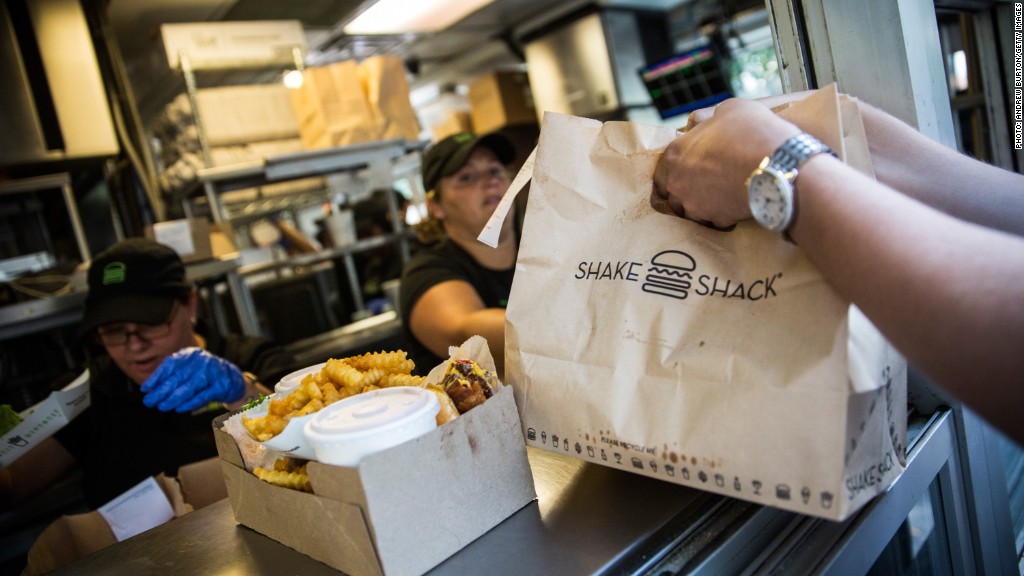
Jules from "Pulp Fiction" would like Shake Shack. They make a tasty burger.
But it's also an expensive burger -- and maybe it's just a little too pricey?
Shake Shack (SHAK) shares got shellacked (alliteration is fun!) on Tuesday, plunging 11% after the company said it expected sales growth to slow dramatically this year.
The burger joint reported late Monday that same-store sales (or same Shack sales as the company oh-so-cutely calls them) may increase just 2.5% to 3.5% in 2016. That's down from the 11% growth rate it reported for the fourth quarter of 2015.
Wall Street was not happy. Five of the 10 analysts covering the company cut their price targets Tuesday according to FactSet Research.
Shake Shack took Wall Street by storm last year, selling itself as a higher quality alternative to the likes of McDonald's (MCD), Burger King, Wendy's (WEN), Sonic (SONC) and other fast food burger joints.
The company went public in late January of 2015 and was an immediate hit. The stock more than doubled on its first day of trading. But Shake Shack has cooled off since then.
Shares now trade for less than $38 -- nearly 20% lower than the price they closed at on their first day of trading and more than 60% below their all-time high.
Related: McDonald's sales soar thanks to all day breakfast
So what's the problem? The burger bubble may be bursting.
Shake Shack's traffic (i.e. the number of customers) rose by an astonishing 6.2% in the fourth quarter. But the company may have trouble adding more new customers going forward.
During a conference call with analysts Monday, executives said they did expect traffic to be up a bit this year. But they added that the gains from the fourth quarter were unsustainable.
To that end, a big chunk of the expected sales growth this year will come from price increases -- not new customers.
Could higher prices be keeping possible customers away? Shake Shack doesn't think so.
Executives went out of their way to say that they aren't feeling competitive pressure from its fast food rivals -- which have been running aggressive price promotions as of late.
The resurgent McDonald's is touting a McPick 2 menu -- 2 items for $5. (It originally was $2 for $2 though.)

Related: Burger King and Wendy's in a fast food price war
Wendy's and Restaurant Brands (QSR)-owned Burger King are targeting the value customer even more -- Wendy's has a 4 for $4 deal while Burger King has one-upped them with a 5 for $4 offer.
"We firmly believe people are more than willing to pay just a little bit more to come to the experience that is Shake Shack," CEO Randall Garutti said.
"We've not seen any impact from that deep discounting that I think has been part of the fast food culture forever in various forms, and we have no intentions to enter that fray," he added.
That may be true. But the company doesn't just have to convince customers that a $8.80 double Smoke Shack (in NYC at least!) is a better buy than a Big Mac or a Whopper. Shake Shack also is competing with other "better burger" chains. And they are legion.
Five Guys. Smashburger. Wahlburger. Umami Burger. Habit. Fatburger. In-N-Out. Whataburger. The list goes on.
Related: Is the IPO market dead?
Some of these companies are regional. But Shake Shack should come up against more of them as it aggressively expands outside its main New York market. The company has plans to open restaurants in LA, Dallas, Phoenix and Minneapolis this year.
Shake Shack's new chicken sandwich may not be enough to get sales growth sizzling again either -- because the number of chicken-themed restaurants around the country are also a dime a dozen.
Confession: I love Shake Shack. Even its veggie burger with portobello mushrooms is yummy.
But the stock's valuation always seemed like a burger that was left on the grill too long -- way overdone.
And now it seems that Wall Street is waking up to the fact that a company shouldn't trade at nearly 100 times earnings estimates when sales growth is expected to be in the low-single digits.
The market can be rational. Imagine that.


